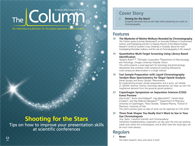Agilent Announces USC Collaboration
Agilent Technologies has announced a strategic scientific collaboration with the University of Southern California (USC) Michelson Center for Convergent Bioscience with the aim of creating an Agilent Center of Excellence (CoE) in biomolecular characterization.
Agilent Technologies (Santa Clara, California, USA) has announced a strategic scientific collaboration with the University of Southern California (USC) Michelson Center for Convergent Bioscience with the aim of creating an Agilent Center of Excellence (CoE) in biomolecular characterization.
“Agilent’s collaboration with the Michelson Center is an excellent example of how academia and industry can work together, sharing knowledge and expertise to shorten the timeline between scientific discoveries and real-world applications,” said Darlene Solomon, senior vice president and chief technology officer for Agilent.
The center will bring researchers together from across science and engineering to work together on multidisciplinary approaches, aiming to develop improved health care through new drugs, diagnostics, and medical devices.
Key to the Agilent CoE will be a collaboration with the USC Michelson Center principal investigator Valery Fokin. The Fokin laboratory at USC focuses on chemical reactivity and biological interactions at the molecular level and will contribute to multiple collaborative drug discovery projects ranging from chemical synthesis of screening and focused libraries and biological assay implementation to the development of targeted drug delivery systems, diagnostics, and vaccines.
Additional notable contributors to this collaboration include: Steve Kay, Provost Professor of Neurology, Biomedical Engineering, and Biological Sciences; Raymond C. Stevens, Provost Professor of Biological Sciences and Chemistry; and Peter Kuhn, Dean’s Professor of Biological Sciences.
“Convergent bioscience research requires successful collaboration across multiple disciplines-a holistic approach that is central to Agilent’s view of the future,” said Solomon.
For more information, please visit www.agilent.com or https://michelson.usc.edu/

HPLC 2025 Preview: Fundamentally Speaking (Part 1)
May 13th 2025Michael Lämmerhofer from the Institute of Pharmaceutical Sciences, University of Tübingen, Germany, spoke to JFK Huber Lecture Award winner of 2024 Torgny Fornstedt, professor in analytical chemistry and leader of the Fundamental Separation Science Group, Karlstad University, Sweden, about his pioneering work in high performance liquid chromatography (HPLC) with a focus on fundamentals and industrial applications.
Reversed-Phases for LC Deliberately Doped with Positive Charge: Tips and Tricks for Effective Use
May 13th 2025In this month's edition of LC Troubleshooting, Dwight Stoll and his fellow researchers discuss both the benefits (improved peak shape/loading) and challenges (excessive interaction) associated with charge-doped reversed-phase (RP) columns for both analytical and preparative separations.
Determining Ways to Protect Honeybee Colonies with GC–MS
May 13th 2025A study conducted by the Agriculture Research Centre of Giza, Egypt, and Jilin Agricultural University in China, evaluated the efficacy of stinging nettle extract, nettle smoke, and formic acid in the controlling of Varroa mites, a major threat to honeybee colonies, with a focus on mite infestation reduction, honeybee mortality, and biochemical responses. Gas chromatography–mass spectrometry (GC–MS) was used to identify key bioactive compounds in the stinging nettle extract.

.png&w=3840&q=75)

.png&w=3840&q=75)



.png&w=3840&q=75)



.png&w=3840&q=75)












